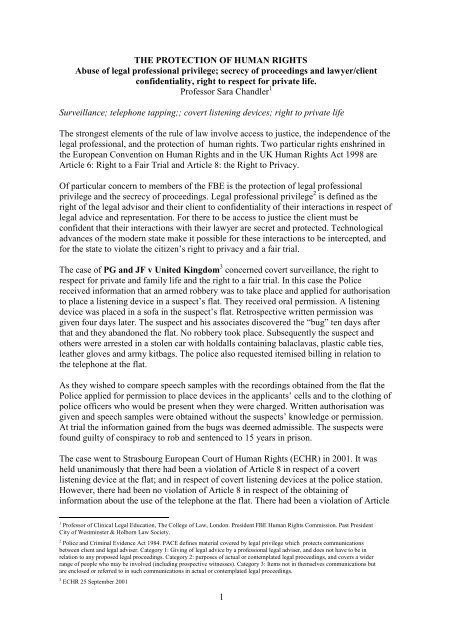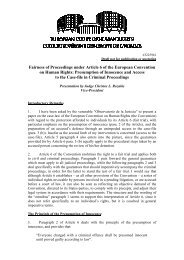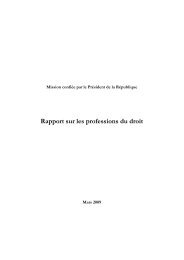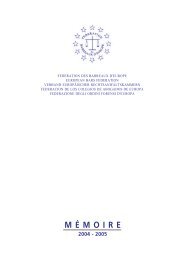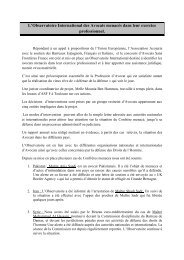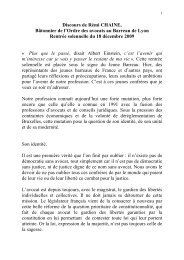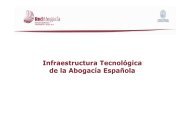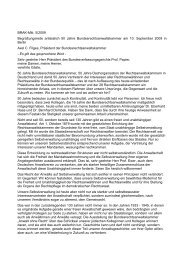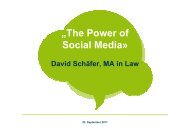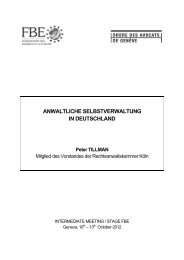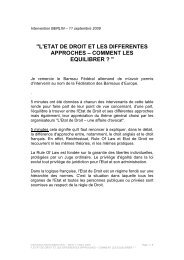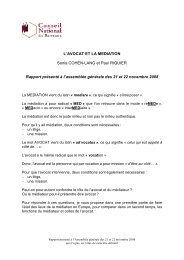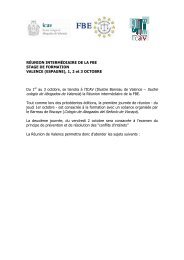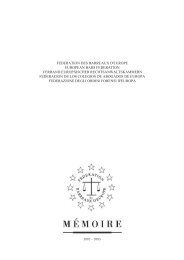Sara Chandler
Sara Chandler
Sara Chandler
Create successful ePaper yourself
Turn your PDF publications into a flip-book with our unique Google optimized e-Paper software.
THE PROTECTION OF HUMAN RIGHTS<br />
Abuse of legal professional privilege; secrecy of proceedings and lawyer/client<br />
confidentiality, right to respect for private life.<br />
Professor <strong>Sara</strong> <strong>Chandler</strong> 1<br />
Surveillance; telephone tapping;; covert listening devices; right to private life<br />
The strongest elements of the rule of law involve access to justice, the independence of the<br />
legal professional, and the protection of human rights. Two particular rights enshrined in<br />
the European Convention on Human Rights and in the UK Human Rights Act 1998 are<br />
Article 6: Right to a Fair Trial and Article 8: the Right to Privacy.<br />
Of particular concern to members of the FBE is the protection of legal professional<br />
privilege and the secrecy of proceedings. Legal professional privilege 2 is defined as the<br />
right of the legal advisor and their client to confidentiality of their interactions in respect of<br />
legal advice and representation. For there to be access to justice the client must be<br />
confident that their interactions with their lawyer are secret and protected. Technological<br />
advances of the modern state make it possible for these interactions to be intercepted, and<br />
for the state to violate the citizen’s right to privacy and a fair trial.<br />
The case of PG and JF v United Kingdom 3 concerned covert surveillance, the right to<br />
respect for private and family life and the right to a fair trial. In this case the Police<br />
received information that an armed robbery was to take place and applied for authorisation<br />
to place a listening device in a suspect’s flat. They received oral permission. A listening<br />
device was placed in a sofa in the suspect’s flat. Retrospective written permission was<br />
given four days later. The suspect and his associates discovered the “bug” ten days after<br />
that and they abandoned the flat. No robbery took place. Subsequently the suspect and<br />
others were arrested in a stolen car with holdalls containing balaclavas, plastic cable ties,<br />
leather gloves and army kitbags. The police also requested itemised billing in relation to<br />
the telephone at the flat.<br />
As they wished to compare speech samples with the recordings obtained from the flat the<br />
Police applied for permission to place devices in the applicants’ cells and to the clothing of<br />
police officers who would be present when they were charged. Written authorisation was<br />
given and speech samples were obtained without the suspects’ knowledge or permission.<br />
At trial the information gained from the bugs was deemed admissible. The suspects were<br />
found guilty of conspiracy to rob and sentenced to 15 years in prison.<br />
The case went to Strasbourg European Court of Human Rights (ECHR) in 2001. It was<br />
held unanimously that there had been a violation of Article 8 in respect of a covert<br />
listening device at the flat; and in respect of covert listening devices at the police station.<br />
However, there had been no violation of Article 8 in respect of the obtaining of<br />
information about the use of the telephone at the flat. There had been a violation of Article<br />
1 Professor of Clinical Legal Education, The College of Law, London. President FBE Human Rights Commission. Past President<br />
City of Westminster & Holborn Law Society.<br />
2 Police and Criminal Evidence Act 1984. PACE defines material covered by legal privilege which protects communications<br />
between client and legal adviser. Category 1: Giving of legal advice by a professional legal adviser, and does not have to be in<br />
relation to any proposed legal proceedings. Category 2: purposes of actual or contemplated legal proceedings, and covers a wider<br />
range of people who may be involved (including prospective witnesses). Category 3: Items not in themselves communications but<br />
are enclosed or referred to in such communications in actual or contemplated legal proceedings.<br />
3 ECHR 25 September 2001<br />
1
13 in respect of the use of covert listening devices and the State was to compensate the<br />
applicants as there was no domestic remedy available at that time.<br />
It was held by six votes to one that there had been no violation of Article 6 (1) in respect of<br />
the use at trial of the materials obtained by the covert listening devices.<br />
In respect of the right to private life the covert listening surveillance in the suspect’s home<br />
amounted to an interference with the applicants’ right to respect for their private life. In the<br />
absence of domestic law regulating the use of covert listening devices at that time, the<br />
interference had not been in accordance with the law. Since the case of Klass v Germany<br />
the ECHR has viewed the interception of communications (mail and phone) as potentially<br />
an interference with family and private life. “Powers of secret surveillance of citizens,<br />
characterising as they do the police state, are tolerable under the Convention only insofar<br />
as strictly necessary for safeguarding the democratic institutions.....” 4<br />
With regard to the metering of the telephone, the Court held that if done by a telephone<br />
company for billing purposes, metering does not infringe Article 8. There is a difference<br />
between this and the interception of communications by the state. The test of whether the<br />
interference had been “in accordance with the law” depends on the nature and extent of the<br />
interference. The use to which the interception in the case of PG v United Kingdom could<br />
be put had been strictly limited and had been obtained and used solely in the investigation<br />
of the suspected conspiracy to commit armed robberies. The measure had been justified as<br />
“necessary in a democratic society”<br />
Some activities might be recorded or reported in a public manner, such as walking down a<br />
street where there are CCTV cameras present, where a person can be seen by any member<br />
of the public present. Private life considerations might arise once any systematic or<br />
permanent record came into existence in the public domain. Although when answering<br />
questions put by the police officers in the police station the applicants in PG v United<br />
Kingdom knew that they were being listened to, it is a different matter that their voices had<br />
been recorded and analysed without their knowledge or permission. Since there was no<br />
statutory system to regulate the use of covert listening devices by the police on their<br />
premises at that time, the recording amounted to an interference with the applicants’ right<br />
to respect for private life.<br />
The dissenting Judge in PG v United Kingdom (Judge Tulkens) stated in respect of the<br />
Article 6 infringement that he could not consider the trial as “fair” if the evidence obtained<br />
violated Article 8, in breach of a fundamental right guaranteed by the Convention. In Klass<br />
v Germany the Court stressed that the Convention must be interpreted as a coherent whole.<br />
The dissenting Judge agreed with the dissenting Judge Loucaides in Khan v United<br />
Kingdom 5 who wrote:<br />
“ fairness when examined in the context of the European Convention on Human Rights,<br />
implies observance of the rule of law and for that matter it presupposes respect of human<br />
rights set out in the Convention. I do not think one can speak of a ‘fair’ trial if it is<br />
conducted in breach of the law”<br />
Judge Tulkens continued that in concluding that there had not been an Article 6 violation<br />
the Court renders Article 8 ineffective. The rights enshrined in the Convention cannot<br />
4 (1980) 2 EHRR 214<br />
5 (2001) 31 EHRR 45<br />
2
emain purely theoretical or virtual because “the Convention must be applied in such a way<br />
as to guarantee rights that are practical and effective” 6 He drew attention to a serious risk<br />
as identified by Judge Loucaides in Khan: “If violating Article 8 can be accepted as ‘fair’<br />
then I cannot see how the police can be effectively deterred from repeating their<br />
impermissible conduct.” 7<br />
The difference between the majority and the minority views in PG v United Kingdom<br />
highlights the essential need for the Court to interpret the relationship between the<br />
protection given by Articles 8 and Articles 6 together. In interpreting whether the intrusive<br />
activities of the state have been carried out in accordance with the law there must be an<br />
examination of domestic law as well as compliance with the Convention.<br />
Legal professional privilege and UK/EHRR caselaw<br />
In Malone v United Kingdom 8 the police tapped and metered the applicant’s phone. The<br />
ECHR established that metering carried out by a telephone company for billing purposes<br />
does not breach Article 8 and should be distinguished from the interception by the Police<br />
of communications. It was found that there had been a breach of Mr M’s Article 8 rights.<br />
In Campbell v United Kingdom 9 it was a breach of Article 8 when the Prison Governor<br />
read letters between prisoner and legal adviser. In Khan v United Kingdom 10 the ECHR<br />
found that the use of recordings of Mr K’s conversations breached Article 8 but did not<br />
breach Article 6 even thought the surveillance had not been in accordance with the law.<br />
It is recognised that the use of covert surveillance can be carried out with authorisation,<br />
however unless the evidence can be challenged in Court then there remains little protection<br />
of human rights under the Convention or even the protection of legal professional<br />
privilege. In 2008 the UK Government considered the need to review statutory protection.<br />
The President of the Law Society at that time, Andrew Holroyd, stated: “The law requires<br />
that conversations between a solicitor and their client are legally privileged. All monitoring<br />
should cease and if a conversation between a solicitor and a client is captured accidentally<br />
the tape should be destroyed.”<br />
UK Domestic regulation:<br />
UK domestic law provides for regulation of state investigatory activities The Regulation<br />
of Investigatory Powers Act (RIPA) 2000 established that it is an offence for any person<br />
intentionally, and without lawful authority, to intercept any communication in the course of<br />
its transmission through a public telecommunication system, and –except in specified<br />
circumstances- through a private telecommunication system. This makes telephone tapping<br />
an offence. RIPA tests whether surveillance is legal or illegal.<br />
There are 3 tests in ECHR jurisprudence on respect for private life: accordance with the<br />
law, necessary in a democratic society and proportionality. “In accordance with the<br />
law” has been interpreted by the ECHR as requiring that there be a clear legal<br />
framework, either under common law or statute. The 1984 Police & Criminal Evidence<br />
Act provides the basis of statutory protection of suspect’s rights and the exercise of legal<br />
6 Comingersoll SA v Portugal (2001) 31 EHRR 31; Beer v Germany (2001) 33 EHRR 3<br />
7 Khan v United Kingdom (2001) 31 EHRR 45<br />
8 (1985) 7 EHRR 14<br />
9 (1992) 15 EHRR 137<br />
10 (2001) 31 EHRR 45<br />
3
professional privilege. RIPA provides for authorisation by the issue of a warrant by the<br />
Home Secretary and can only to be issued if the Home Secretary believes it is<br />
“necessary” for certain specified purposes and the conduct authorised is proportionate to<br />
what is achieved by that conduct. Specified purposes are “in the interests of national<br />
security, for the purpose of preventing or detecting serious crime or in the interests of<br />
the economic well-being of the United Kingdom, or giving effect to an international<br />
mutual assistance agreement in circumstances equivalent to those for preventing or<br />
detecting serious crime” 11<br />
Under RIPA the Office of Surveillance Commissioners (OSC) monitors and reports<br />
on the use of surveillance. Commissioners review all surveillance authorisations and<br />
have the power to quash any authorisations found to be outside the powers. RIPA set up<br />
the Investigatory Powers Tribunal to deal with complaints from members of the public<br />
about the use of statutory powers and the conduct of public authorities.<br />
In PG v United Kingdom ECHR found that the system of investigation of complaints at<br />
that time (before RIPA) did not meet the standards of independence required to<br />
constitute sufficient protection against abuse of authority and thus provide an effective<br />
remedy.<br />
Photographic and film surveillance:<br />
Two related cases highlight the continued need for protection of human rights in regard to<br />
state surveillance. In the case of Peck v United Kingdom 12 closed circuit television was<br />
used to film the applicant carrying a large knife around his local town centre while in the<br />
process of attempting suicide. This material was then publicised without the applicant’s<br />
knowledge or permission. At the ECHR it was held that there had been a violation of<br />
Article 8 and Article 13 and the UK was ordered to pay compensation and legal costs. No<br />
crime had been committed and therefore no Article 6 consideration. In the case of Perry v<br />
United Kingdom 13 the applicant was arrested in connection with a series of armed<br />
robberies of mini cab drivers. The applicant refused to attend identity parades and so the<br />
Police applied for authorisation to video him in the Police Station without his knowledge.<br />
The video footage was shown subsequently to witnesses, he was identified, and at trial in<br />
he was convicted. Neither the applicant nor his solicitor was informed that the video had<br />
been made or used for identification purposes. It was held unanimously at the ECHR that<br />
there had been a violation of the applicant‘s Article 8 right to respect for private life. The<br />
UK Government was ordered to pay compensation and legal costs. Article 8 and Article 6<br />
need consideration in all cases of state surveillance.<br />
Vigilance by defenders of human rights<br />
It is the vital role of the legal profession to maintain a watch on the human rights of<br />
every member of society and in this instance we, as lawyers, are the defenders of human<br />
rights. The Convention should be integrated into our common thinking and daily<br />
practice as legal professionals. Our vigilance is the safeguard of the rule of law, access<br />
to justice, the protection of human rights and modern democratic society.<br />
Ends<br />
11 RIPA 2000 Section 5 (3)<br />
12 (2003) 36 EHRR 41<br />
13 (2004) 39 EHRR 3<br />
4


